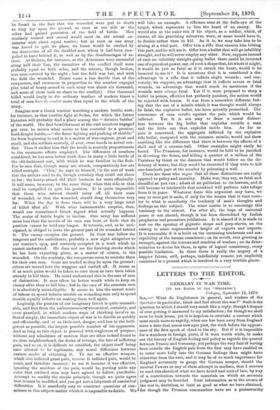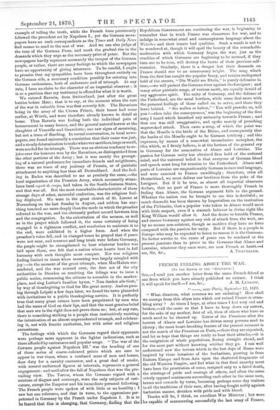LETTERS TO THE EDITOR.
GERMANY IN WAR TIME.
[To THE EDITOR. OF THE "SrEctirolt.1 Cologne, Septeniber 13, 1870. SIR,—" What do Englishmen in general, and readers of the Spectator in pal ticular, think and feel about the war ?" Such is the question to which I should very much like a reply, though I despair of ever getting it answered to my satisfaction ; for though we shall soon be back home, yet it is hopeless to overtake a current which must needs move so rapidly, when one has been away from England since a date that seems now ages past, the week before the appear- ance of the first speck of cloud in the sky. But if it is impossible for a wanderer in foreign parts, if it were worth while, to make out the history of English feeling and policy as regards the quarrel between France and Germany, yet perhaps the very fact of having been outside the English pale from the first may have enabled us to enter more fully into the German feelings than might have otherwise been the case, and it may be of so much importance for England accurately to gauge the German temper, should the neutral Powers or any of them attempt to mediate, that I venture to send this sketch of what we have heard and seen of late, by way of a contribution towards the materials on which an accurate judgment may be founded. Your information as to the events of the war is, doubtless, at least as good as what we have obtained, for though the Prussian commanders have set a praiseworthy
example of telling the truth, while the French have persistently followed the precedent set by Napoleon I., yet the German news- papers have no such correspondents as the Times and Daily News find means to send to the seat of war. And we can also judge of the tone of the German Press, and mark the gradual rise in the demands which they urge as the necessary price of peace. But the newspapers hardly represent accurately the temper of the German people, or rather, there are many feelings to which the newspapers have no opportunity of giving utterance. To be candid, I ought to premise that my sympathies have been throughout entirely on the German side, a necessary condition possibly for entering into German enthusiasm, both of endurance and of triumph. At any rate, I have no claim to the character of an impartial observer ; it is as a partizan that my testimony is offered for what it is worth.
We entered Bavaria, from Switzerland, just after the great battles before Metz ; that is to say, at the moment when the cost of the war in valuable lives was first severely felt. The Bavarians being in the army of the Crown Prince, their losses bad come earlier, at Worth, and were therefore already known in detail at home. Thus Bavaria was feeling both the individual pain of bereavement in many homes, and the general natural horror at the slaughter of Vionville and Gravelotte ; one saw signs of mourning,
but not a trace of flinching. In casual conversation, in local news- papers, one found uuiversally a conviction that their cause was just,
and a steady determination to make whatever sacrifices,large or small, were needed for its triumph. There was an obvious tendency to re- joice over the honours won by the Bavarians, as distinguished from the other portions of the Army ; but it was merely the prompt- ing of a natural preference for immediate friends and neighbours, there was no trace of any jealousy of Prussia, or of patriotic attachment to anything less than all Deutschland. And the feel- ing in Baden was described to me as precisely the same,—the local organization of the Prussian Army, which necessarily stimu- lates local esprit de corps, had taken in the South-German States, and that was all. But the most remarkable characteristic of these strange days of sober, mournful exaltation, was the religious feel- ing displayed. We were in the great church of St. Lorenz at Nuremberg on the last Sunday in August, and seldom has any- thing touched me more deeply than the mode in which the preacher referred to the war, and the obviously perfect accord between him and the congregation. In the exhortation of the sermon, as well as in the prayer which followed it, the same certainty of being engaged in a righteous conflict, and resolution to maintain it to the end, were exhibited in a higher form. And when the preacher's voice fell, and in changed tones he prayed that if peace were not near, and reverses and long trials were before Germany, the people might be strengthened to bear whatever burden was laid upon them, one felt that a nation whose hearts beat in full harmony with such thoughts must conquer. Nor was religious feeling limited to times *lien mourning was largely mingled with joy :—in the moment of the great triumph, when MacMahon sur- rendered, and the war seemed over, the first act of the city authorities in Dresden on receiving the tidings was to issue a public notice, summoning the citizens to assemble in the market- place, and sing Luther's familiar hymn, "Nun danket alle Gott," by way of thanksgiving to God for His great mercy. And on pass- ing through Leipsic a few days later, we found the town placarded with invitations to a public thanksgiving service. It is perfectly true that many great crimes have been perpetrated by men who had the name of God on their lips, and that the most genuine belief that men are in the right does not prove them so ; but, at any rate, there is something striking in a people thus instinctively resisting the intoxication of an almost unprecedented triumph, and celebrat- ing it, not with frantic exultation, but with sober and religious earnestness.
The feelings with which the Germans regard their opponents were perhaps more apparent in the lighter indications, such as those afforded by caricatures and popular songs. "The war of the German people against Napoleon III." was the heading of one of those series of coarse-coloured prints which are sure to appear in war times, where a confused mass of men and horses, does duty for a cavalry encounter, and a great deal of smoke, with several uniformed figures at intervals, represents a general engagement: and until after the fall of Napoleon that was the pre- vailing view. The Turcos, whom the Germans regard with a mixture of disgust and contempt, were the only subjects of cari- cature, except the Emperor and his immediate personal following. The French people were spoken of with little or no hostility ; I saw but one reference, and that in verse, to the oppressions per- petrated in Germany by the French under Napoleon I. It is to be feared that this is changing, that Germany, finding that the Republican Government are continuing the war, is beginning to remember that in truth France was clamorous for war, and to indulge in somewhat cruel and contemptuous language about the Welschen and their innate bad qualities. Such a result is not to be wondered at, though it will spoil the beauty of the remarkable moderation with which Germany began the war, just as the cruelties of which Germans are beginning to be accused, if they turn out to be true, will destroy the lustre of their previous self- restraint. Similarly, there is a danger lest their demands on France should rise to an unnecessary height. The song which from the first has caught the popular fancy, and retains undisputed hold of the streets, "Die 1Vacht am Rhein," is purely defensive in tone,—we will protect the German river against the foreigner ; and many other patriotic songs, of various merit, are equally devoid of any aggressive spirit. The unity of Germany, and the defence of the Fatherland, are the usual burthen, while some deal more with the personal feelings of those called on to serve, and those they leave behind. "Sic wollen es haben," 'You will provoke us, will you ?—then take the consequences,' was the beginning of the first song I heard which breathed any animosity towards France ; and that one was still unaggressive, and spoke merely of punishing unprovoked attack. Then came a song, of which the point was that the Moselle is the bride of the Rhine, and consequently that the banks of the Moselle ought to be German territory ; and this expresses, by means of a somewhat inconclusive metaphor, the idea which, as I firmly believe, is at the bottom of the general cry in Germany for the annexation of Alsace and Lorraine. The passion for German unity has obtained firm hold of the national mind, and the universal belief is that everyone of German blood and speech must long for reunion to the Fatherland. Alsace and parts of Lorraine are unquestionably German in race and language, and were annexed to France unwillingly ; therefore, cries all Deutschland, we must deliver our brethren from the yoke of the foreigner. But if it be true, as almost all impartial observers declare, that no part of France is more thoroughly French in feeling than Alsace, the German argument falls to the ground. Whether the nation can be brought to see this is doubtful ; so much discredit has been thrown by Imperialism on the institution of the Plebiscite, that a popular vote taken in Alsace would meet with little respect, even if a staunch believer in divine right like King William would allow it. And the desire to humble France, and ensure Germany against any risk of attack from the west, are by no means non-existent, though as motives they have no force compared with the passion for unity. But if there is a people in Europe who may be expected to listen to reason it is the Germans. No better service to the cause of peace can be rendered at the present juncture than to prove to the Germans that Alsace and Lorraine, whatever they once were, are now French at heart.—I































 Previous page
Previous page